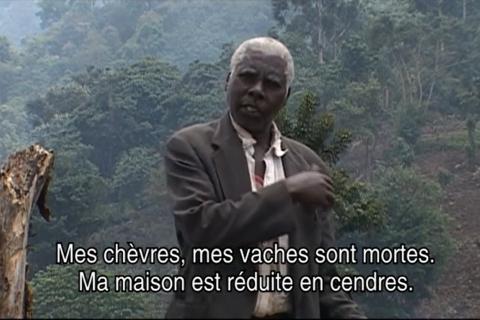WRM information sheets on GE tree research
First posted: 18 August 2008
Last update: August 2014
Forest tree species being manipulated:
rubber tree (1)
Aim of genetic manipulation
Other information
WRM information sheets on GE tree research
First posted: 1st August 2008
Last update: August 2014
Tree species being manipulated:
eucalyptus
Aim of genetic manipulation
"My house and goats are dead, my house burned to the ground," recounts a Ugandan farmer at the start of this downloadable film. "My coffee and banana trees were chopped down, and new trees were planted in their place."
"We should bring developing countries on board using a variety of means," counters a Dutch businessman and carbon trader.
WRM information sheets on GE tree research
First posted: 1 August 2008
Updated: 30 October 2008 (including information provided by the Global Justice Ecology Project)
Updated: 10 July 2009, based on (1) and (2) (Field trials)
Last update: August 2014
WRM information sheets on GE tree research
First posted: 1 August 2008
Last update: August 2014
Forest tree species being manipulated:
Eucalyptus (1)
Aim of genetic manipulation
WRM information sheets on GE tree research
First posted: 1 August 2008
Updated: 1 October 2008 (including information provided by the Canadian Biotechnology Action Network)
Updated: August 2014 (including information provided by the Canadian Biotechnology Action Network)
Tree species being engineered:
WRM information sheets on GE tree research
First posted: 1 August 2008
Last update: August 2014
Tree species being manipulated:
Pine (Pinus radiata)
Eucalyptus ( globulus)
Aim of genetic manipulation
WRM information sheets on GE tree research
First posted: 1 August 2008
Modified: 27 November 2008
Modified: 7 August 2009
Last update: August 2014
Tree species being manipulated:
WRM information sheets on GE tree research
First posted: 1 August 2008
Last update: August 2014
Tree species being manipulated:
Nordmann Fir (Abies nordmanniana) (1)
Aim of genetic manipulation
WRM information sheets on GE tree research
First posted: 1 August 2008
Last update: August 2014
Tree species being manipulated:
hybrid aspen (Populus)
silver birch (Betula pendula)
Aim of genetic manipulation
WRM information sheets on GE tree research
First posted: 1 August 2008
Updated: 15 August 2008, based on information from (1)
Last update: August 2014
Tree species being manipulated: (1,2,3)





